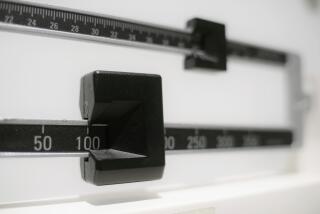Science / Medicine : Women Can Be Both Fit and Fat, Oregon Study Shows
- Share via
CORVALLIS, Ore. — Fit or fat? Women don’t have to choose one or the other, according to researchers at Oregon State University. They can be both.
During a nine-month study, 15 overweight women ate less fat and exercised regularly but not strenuously. Only six lost weight, but 11 in the group improved their health-risk factors. Blood cholesterol levels and blood pressure dropped, and aerobic capacity increased.
Collaborating on the study were Jane Moore and James E. Leklem, both in the university’s foods and nutrition department. Having the women lose weight wasn’t the goal of the project--it was to change their living habits.
“In our culture, we see obese people as unhealthy,” Moore said. “This study demonstrates that drastic weight loss isn’t necessary to improve health.”
Still, the study wasn’t intended as an excuse to go ahead and be fat, she said. In shifting the focus to habit changes, “we’re advocating the tougher road. It’s the day-in, day-out struggle. We’re barraged with information about how to have bad habits, so to change dietary and activity habits is a tremendous challenge.”
To keep the challenge manageable, the program avoided drastic approaches. The exercise bore no relation to Jane Fonda-type workouts. The participants walked for at least 40 minutes three times a week, more only if they wished.
Brown Rice and Beans
The women weren’t put on specific diets. They received nutrition education and general eating plans. The emphasis was on eating more complex carbohydrates, such as brown rice and beans and other vegetables, while cutting fat consumption.
The researchers also studied body composition. The dietary-exercise format was specifically designed not to reduce lean body mass, a typical side effect of some low-calorie diets popular today, the researchers said. That kind of program can lead to a quick regaining of lost weight, they pointed out.
The eating plans ranged from 1,800 to 2,000 calories a day, about 500 calories less than needed to maintain each participant’s starting body weight. The level was set during a three-week metabolic check at the start of the study.
The tests were repeated at the end of the study to assess any changes.
“Part of the problem in losing weight,” Leklem said, “is that the number of calories needed drops as weight drops.” The results showed the study’s regimen succeeded in maintaining lean body mass.
The women learned that with a low-fat, high-carbohydrate diet there can be “a lot of food to eat,” Moore said. “Because fat calories are very concentrated, you don’t need much volume. A low-fat, high-complex-carbohydrate diet helps control calorie intake because you get to eat much more food. The participants found this can be satisfying and you don’t have to be hungry.”
‘Drastic Improvements’
The women also found “drastic improvements in their ability to do things physically, even though we were not doing drastic things to them--no drastic training, no drastic diets.”
Near the end of the study, several of the women competed in a team triathlon and later entered a local festival run.
“Most walked rather than ran, but it showed they felt better physically and psychologically,” Moore said.
The study showed that better health is possible “without going to the extremes other people have suggested,” Leklem said. A diet of just 10% fat content, recommended by some, is very hard to sustain, he pointed out. The OSU study included a fat intake of 25%-30% of calories, a much more realistic, long-term figure, the researchers noted.
“With this study, we hope to challenge the idea you have to be thin to be healthy,” Moore said. “We definitely favor encouraging people to become more fit, but many have oversimplified fitness by equating it with just one body shape and size.”
The researchers reported on the study recently at the annual meeting of the Federation of American Societies for Experimental Biology.





